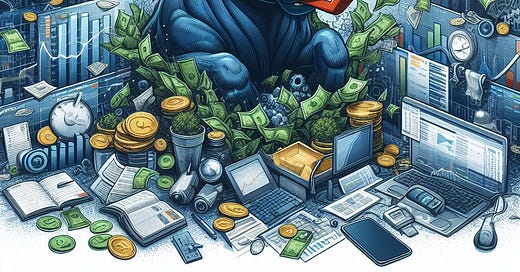The Easiest 18% Profit You'll Ever Make
In this issue, we examine the 18%-return-in-a-month opportunity from TCS's buyback program. Plus, we investigate the 300% surge in BSE Limited's stock price and see if there's more fuel in that tank
Hi everyone and welcome to the first issue of my newsletter. I have a couple of stories for you in this issue and it was an absolute pleasure putting this together
Yes, there’s a lot of work to do with this newsletter, fashionably and functionally, so please expect small improvements in every edition going forward. As always, your encouragement and feedback will be important. Let’s go!
Story 1 of 2 (Reading time: 1.5 mins)
296% Stock Surge: Why BSE's Rise Isn't Slowing Down Anytime Soon
BSE Limited’s share price is up 296% in 6 months! And while this part of the movie is done and dusted, I’m sure we’re all keen in know how BSE silently piled on the numbers and if there is any fuel left in the tank
So here’s what happened
On the 15th of May 2023, BSE Limited relaunched the Sensex and Bankex derivative contracts in its bid to boost derivative trading (news).
This was a significant event because until then the National Stock Exchange had a monopoly on it (98.5% market share) and financially, the derivative segment was contributing 88% of NSE’s transaction revenues
The trading community’s response was swift and strong with a turnover of ₹17,345 crores in just the second weekly expiry (news) and then ₹69,422 crores by the third weekly expiry (news)
Within six months, BSE’s derivative market share stood at 8.8% – which is still just 10% of NSE’s derivative business!
But there was a problem — BSE Limited was not making money from its derivative business!
My first instinct was that some schmuck VC was funding this enterprise but that’s not it. It was infact a case of under-pricing and BSE was charging too low in transaction charges
In numbers, BSE was charging just 1/7th of what the NSE was billing for derivative trading but this was deliberate strategy on their part as it helped them gain market share while taking care of their clearing cost
But like how Uber, PayTM, Zomato enticed us with discounts only to pull the rug from under our feet (ok, too dramatic), BSE Limited too has increased transaction charges on the equity derivatives segment from November 1, 2023 onwards (news)
This change will certainly spruce up BSE Limited’s bottom line and was immediately rewarded by the investor community with a 13% bump in its share price in a single session (news)
So what was already pricey became even more expensive, with the BSE Limited perched at the top - as the world’s most expensive major stock exchange with a forward PE ratio of 48.3
All said and done, everyone expects a major upgrade in net profit numbers from this quarter (Q3 FY24 onwards)
But remember, this is still very much a developing situation and I for one, will continue tracking the company’s margins, market share (expect NSE to respond) and ofcourse, the valuations
If you like what I write, then please forward this email to your friends & connections and encourage them to subscribe using the button below. Thanks for your support!
Story 2 of 2 (Reading time: 2.5 mins)
Need 18% Profit in a Month? No worries, I got your (buy)back
On the 11th of October 2023, Tata Consultancy Services Limited (TCS) announced India’s 2nd largest share buyback program amounting to ₹17,000 crores (page on TCS website)
If you’re wondering who holds the record, it’s again TCS when they did an ₹18,000 crore buyback in the January of 2022
The record date for this latest program has been fixed for November 25th (yes, day after tomorrow) and based on the buyback rate of ₹4,150, a TCS shareholder can make an ROI of 18.2% based on today’s price of ₹3,510
Furthermore, the income generated from this buyback of shares is tax exempt under Section 10(34A) of the Income Tax Act (yay!)
Let’s look at how an investor can take advantage of it
Scenario 1 : Sure-shot way of making 18%
Per the program terms, TCS has allocated a solid 15% of the total buyback to small shareholders i.e. someone holding shares valued at less than ₹2 lakh. This gives every eligible shareholder (even if you have just one share) the right to participate in the buyback and an in-built priority in the process
This means if you can get enough people in your circle (you, your spouse, child, parents, in-laws etc.) to purchase 1 share of TCS each, then you are pretty much guaranteed an 18% return
Scenario 2 : Investors with less than ₹2,00,000 worth of TCS shares
If you don’t have access to a big pool of willing partners-in-crime then the next best alternative is to buy 48 shares i.e. ₹2,00,000 divided by ₹4,150 to receive maximum entitlement under the retail category
Notice, I’ve used the word “maximum” and not guaranteed because not every retail applicant’s share might be eligible if there is too much tendering of shares
Scenario 3 : Investors with more than ₹2,00,000 worth of TCS shares
If the shares you hold exceeds the ₹2 lakh valuation threshold then it comes down to the acceptance ratio
Acceptance ratio means for every share tendered by a shareholder, the company will accept and repurchase only a % of those shares. The remaining shares would be returned to the shareholder who would retain ownership of those shares
Let’s say you hold 250 shares on the record date i.e. the 25th of November
Assuming a 30% acceptance ratio, 75 of your shares will be bought back by the company at ₹4,150 giving us a return of ₹48,750 (assuming current share price of ₹3,500)
This leaves us with 175 shares and understandably, we don’t want to be in a situation where the price dips sharply once the buyback program has concluded
This next part might be slightly complicated so take your time
Essentially, you should be in a position to hedge your risk and this can be done by shorting TCS December futures which are currently trading at ₹3,533 – a small 0.6% premium to the current share price
Once the buyback program concludes or as & when the acceptance ratio gets revealed, you can square off the remaining 175 shares in your demat account with the futures you’ve shorted. This minimizes the risk of sharp price swings while you pocket the returns you’ve made from the accepted 75 shares
If you’re drawing a blank on shorting futures, please watch my video on Futures & Options for a beginner’s understanding of the concept
So the acceptance ratio is the big assumption here and from what I’ve read it’s generally around the 30% plus/minus 5% range
To conclude, the TCS buyback program presents us with a unique window to make additional returns without taking comparable risk
Nice one, right? If you know anyone who would love to receive similar stories, then please encourage them to subscribe to my newsletter. Thanks for your support!
The Library
Reading is a prerequisite to successful investing. In this section, I’ll be curating some of the stuff I’m reading or is in my reading watchlist
My recommendation for this week is a collection of letters written by Nicholas (Nick) Sleep and his partner, Qias (Zak) Zakaria of the Nomad Investment Partnership to their investors from 2001 until the fund’s closure in 2014
These letters highlight the philosophy and methodology used by Nomad to approach stock/company picking including many of their investing decisions. You’ll understand business models, success drivers, market psychology, capital allocation, incentive structures and much more. I particularly love the way Nick writes these.
A PDF copy of these letters can be accessed here
Carpe diem & have a pleasant weekend!
Shankar












Hello Shankar,
It gives me great pleasure to extend a warm welcome to you on Substack. Your succinct videos and insights on YouTube have been a source of inspiration and learning for me, and I am delighted to learn that you have expanded your reach by writing here as well. Your insightful gems have always been a great source of knowledge and I look forward to learning more from your profound expertise.
This Newsletter has simple language and the content can be understood easily i.e in laymen terms. Awesome Initiative Shankar!!!